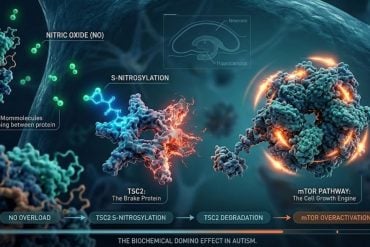Summary: Researchers report levels of social impairment remain stable for those with psychosis, years after their first hospitalization.
Source: Brain and Behavior Research Foundation.
Many patients with psychotic disorders, including schizophrenia and some cases of major depression and bipolar disorder, experience difficulty establishing relationships and participating in social activities. These problems can begin prior to the onset of illness. Now, a new 20-year study which followed hundreds of patients, has found that levels of social impairment remain remarkably stable in the years after a first hospitalization for psychosis.
The study, reported November 1, 2017 in the American Journal of Psychiatry, included people with schizophrenia spectrum disorders (schizophrenia, schizoaffective disorder, and schizophreniform disorder), and psychotic mood disorders (major depressive disorder with psychosis, and bipolar disorder with psychosis). A team led by Dr. Roman Kotov of Stony Brook University (SBU), recipient of a Young Investigator grant in 2009, found that participants followed different trajectories of social functioning, and that these trajectories changed quite a bit from childhood to first hospitalization, but remained largely flat after that.
Six hundred and twenty eight patients with psychotic disorders were initially recruited to the study between 1989 and 1995. At the time of their enrollment, all were between the ages of 15 and 60 and had been recently hospitalized for their illness for the first time. At the 20-year point, 262 of those who remained in the study were assessed. A comparison group of 262 individuals who had never experienced psychosis was matched to patients on age, gender, and zip code.
Study participants’ social functioning was assessed six months after first hospitalization and again two, four, 10, and 20 years later. To determine the degree of social impairment, researchers conducted interviews focusing on participants’ relationships and activities with other people. Patient responses were supplemented with available medical records and input from significant others. Using interviews and school records, the researchers also assessed individuals’ social functioning in childhood and adolescence, prior to the onset of their illness.
People with schizophrenia and related disorders tended to experience more social impairments over the 20-year period than did individuals diagnosed with psychotic mood disorders. But the degree of social impairment varied significantly between individuals, regardless of what diagnosis they had. Trajectories of social functioning remained surprisingly stable over the two decades.
For some individuals with psychotic mood disorders, social functioning was similar to that of individuals in the “never psychotic” group. But, 35 percent of participants with major depressive disorder and 18 percent of those with bipolar disorder, were affected by severe and persistent social impairments. In the participants with schizophrenia spectrum disorders, 75 percent had severe and persistent social impairments.
Twenty years into the study, functional outcomes, such as whether individuals had earned a high school diploma, their employment status, and their financial independence, were poorest in those groups in the study with the lowest levels of social functioning.

The team found that patients’ social functioning trajectories began to emerge in childhood and adolescence prior to onset of illness, highlighting the importance of early interventions for high-risk individuals.
Some researchers have suggested that social impairment often can be reduced in people with first-episode psychosis, if they are treated early in a setting of fully integrated care that includes continuing social and vocational counseling. The problem is that such care is often not available to patients in the United States under current medical system and social insurance arrangements.
Co-first authors of the team’s paper were Anne-Kathrin J. Fett, Ph.D., a 2015 Young Investigator at Vrije Universiteit, Amsterdam, Netherlands, and Eva Velthorst, Ph.D., of the Icahn School of Medicine at Mount Sinai. The team also included Greg Perlman, Ph.D., a 2013 Young Investigator at Stony Brook University School of Medicine and Jim van Os, M.D., Ph.D., a Foundation Scientific Council Member at Maastricht University Medical Centre in the Netherlands.
Source: Roman Kotov – Brain and Behavior Research Foundation
Publisher: Organized by NeuroscienceNews.com.
Image Source: NeuroscienceNews.com image is in the public domain.
Original Research: Abstract in American Journal of Psychiatry.
doi:10.1176/appi.ajp.2016.15111419
[cbtabs][cbtab title=”MLA”]Brain and Behavior Research Foundation “Social Impairment Levels Remain Stable in Patients with Psychotic Disorders.” NeuroscienceNews. NeuroscienceNews, 21 March 2018.
<https://neurosciencenews.com/psychosis-social-impairment-8683/>.[/cbtab][cbtab title=”APA”]Brain and Behavior Research Foundation (2018, March 21). Social Impairment Levels Remain Stable in Patients with Psychotic Disorders. NeuroscienceNews. Retrieved March 21, 2018 from https://neurosciencenews.com/psychosis-social-impairment-8683/[/cbtab][cbtab title=”Chicago”]Brain and Behavior Research Foundation “Social Impairment Levels Remain Stable in Patients with Psychotic Disorders.” https://neurosciencenews.com/psychosis-social-impairment-8683/ (accessed March 21, 2018).[/cbtab][/cbtabs]
Abstract
The 20-Year Longitudinal Trajectories of Social Functioning in Individuals With Psychotic Disorders
Objective:
Social impairment is a long-recognized core feature of schizophrenia and is common in other psychotic disorders. Still, to date the long-term trajectories of social impairment in psychotic disorders have rarely been studied systematically.
Methods:
Data came from the Suffolk County Mental Health Project, a 20-year prospective study of first-admission patients with psychotic disorders. A never-psychotic comparison group was also assessed. Latent class growth analysis was applied to longitudinal data on social functioning from 485 respondents with schizophrenia spectrum disorders and psychotic mood disorders, and associations of the empirically derived trajectories with premorbid social adjustment, diagnosis, and 20-year outcomes were examined.
Results:
Four mostly stable trajectories of preserved (N=82; 59th percentile of comparison group sample distribution), moderately impaired (N=148; 17th percentile), severely impaired (N=181; 3rd percentile), and profoundly impaired (N=74; 1st percentile) functioning best described the 20-year course of social functioning across diagnoses. The outcome in the group with preserved functioning did not differ from that of never-psychotic individuals at 20 years, but the other groups functioned significantly worse. Differences among trajectories were already evident in childhood. The two most impaired trajectories started to diverge in early adolescence. Poorer social functioning trajectories were strongly associated with other real-world outcomes at 20 years. Multiple trajectories were represented within each disorder. However, more participants with schizophrenia spectrum disorders had impaired trajectories, and more with mood disorders had better functioning trajectories.
Conclusions:
The results highlight substantial variability of social outcomes within diagnoses—albeit overall worse social outcomes in schizophrenia spectrum disorders—and show remarkably stable long-term impairments in social functioning after illness onset across all diagnoses.







